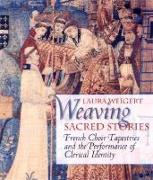- Start
- Weaving Sacred Stories: French Choir Tapestries and the Performance of Clerical Identity
Weaving Sacred Stories: French Choir Tapestries and the Performance of Clerical Identity
Angebote / Angebote:
Spanning the backs of choir stalls above the heads of the canons and their officials, large-scale tapestries of saints' lives functioned as both architectural elements and pictorial narratives in the late Middle Ages. In an extensively illustrated book that features sixteen color plates, Laura Weigert examines the role of these tapestries in ritual performances. She situates individual tapestries within their architectural and ceremonial settings, arguing that the tapestries contributed to a process of storytelling in which the clerical elite of late medieval cities legitimated and defended their position in the social sphere. Weigert focuses on three of the most spectacular and little-studied tapestry series preserved from the fifteenth and early sixteenth centuries: Lives of Saints Piat and Eleutherius (Notre-Dame, Tournai), Life of Saint Steven (Saint-Steven, Auxerre [now Musee du Moyen Age, Paris]), and Life of Saints Gervasius and Protasius (Saint-Julien, Le Mans). Each of these tapestries, measuring over forty meters in length, included elements that have traditionally been defined as either lay or clerical. On the prescribed days when the tapestries were displayed, the liturgical performance for which they were the setting sought to merge the history and patron saint of the local community with the universal history of the Christian church. Weigert combines a detailed analysis of the narrative structure of individual images with a discussion of the particular social circumstances in which they were produced and perceived. Weaving Sacred Stories is thereby significant not only to the history of medieval art but also to art history and cultural studies in general.
Folgt in ca. 15 Arbeitstagen
